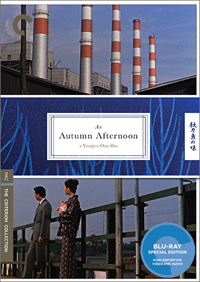The Criterion Collection refurbishes its previous release of Yasujiro Ozu’s 1962 swan song, An Autumn Afternoon for a new digital restoration Blu-ray transfer. The auteur, often described as the ‘most Japanese’ of directors, is a prominent cinematic figure (which explains his heavy presence in Criterion’s vault), ranking alongside the likes of Akira Kurosawa and Kenji Mizoguchi. Yet Ozu was a much more subtle, even methodical filmmaker in comparison, reveling in the depiction of everyday life acted out amongst traditional (some would say banal) activities, meant to reflect the changing cultural landscapes that often place its inhabitants at uncomfortable odds.
An aging widower, Shuhei Hiroyama (Chishu Ryu) lives with daughter Michiko (Shima Iwashita) and a younger son. Michiko tends to her father and brother, and it seems a happy existence for all, but now at the age of twenty-four, outsiders are beginning to question why her father hasn’t arranged for her to be married. All around Hiroyama, he’s confronted with this pressing social obligation. An old friend, Koichi (Keija Sada) has scandalously taken a second, much younger wife, which seems to further deter Hiroyama. But when his group of friends reunite with an old teacher known as The Gourd (Eijiro Tono), who has lived alone for years with his daughter, now a withdrawn spinster, Hiroyama sees that he must, finally, push his daughter from the nest.
An Autumn Afternoon is not Ozu’s best known work, and many point to the emotionally devastating Tokyo Story for that distinction. Its familiar themes sometimes make it hard to distinguish from other similarly named titles, though this is often referred to as a remake of sorts of the earlier 1949 title, Late Spring, in which Chishu Ryu also stars. With his repeated theme and cast members, Ozu seems the likely inspiration for South Korean filmmaker Hong Sang-soo, who works at about the same prolific rate and receives similar criticism for a difficulty in sometimes distinguishing his narratives.
The characters in Afternoon are faced with predicaments Ozu was often fascinated with, and the title also recalls the awkward navigation of arranged marriages that dominated his lesser known 1952 title Flavor of Green Tea Over Rice. Whereas that film focused on the female perspective of these types of arrangements, Michiko is basically a figure here, as Ozu focuses almost entirely on Hirayama. This close relationship between father and daughter faced with an inevitable departure makes for some finely understated melancholy undercurrents, and it’s easy to see how Ozu has inspired a myriad of international filmmakers, with this title in particular bringing to mind Claire Denis’ 2008 film, 35 Shots of Rum.
Disc Review
As gorgeously photographed as any of his better known black and white or color titles, Criterion presents an elegant 4K digital restoration of this final film from Ozu. Considering it’s a title that has already been part of the collection for some time, a lack of additional extra features seems curious. But considering the relative unhappiness that usually graces Ozu’s characters, there’s an upbeat energy evident here, and when we’re not immersed in the dramatic predicament its lead characters would prefer to ignore, we’re up in the skylines and rooftops of An Autumn Afternoon, with sunshiny, bright blue weather.
Yasujiro Ozu and The Taste of Sake:
A 1978 episode of the French television program Cine Regards features critics Michel Ciment and Georges Perec as they discuss Ozu’s career, with particular focus on his last title. The critics speak of Ozu’s ‘mysteriousness in his simplicity.’
Final Thoughts
An Autumn Afternoon is an inadvertent farewell to not only Yasujiro Ozu, but his regular DoP Yuharu Atsuta, who would go on to work on one other post-Ozu feature in 1963 before disappearing until his death in 1993. In between the very familiar human story, we’re treated to shots of the colorful, changing culture all around them, which lends the film a rather exciting, expectant energy of great new things to come in the unknown but bright future. With a sad resignation, Hirayama, played with Chishu Ryu’s customary warmth, realizes that he must release his daughter to her own destiny, wherever that may lead. Tellingly, we never see her groom, because it doesn’t matter, presented with an opportunity to engage in a world of possibilities previously unknown to her.
Film: ★★★½/☆☆☆☆☆
Disc: ★★★½/☆☆☆☆☆
